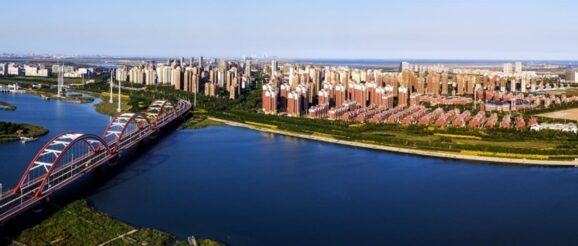Sino-Singapore Tianjin Eco-City to have green innovation park, be a model for other Chinese cities

Sino-Singapore Tianjin Eco-City to have green innovation park, be a model for other Chinese cities Singapore and Tianjin will also establish a green and digital shipping corridor – the first such corridor to connect the two countries. TIANJIN: As the China-Singapore Tianjin Eco-City marks its 15th anniversary this year, both countries announced on Thursday (Dec 7) that it will be developed into a zone that exemplifies low-carbon economic growth and serves as a model for other Chinese cities. Works for a green innovation park will also begin this year at the Eco-City’s city centre. Singapore’s Deputy Prime Minister Lawrence Wong officiated a groundbreaking ceremony on Thursday, along with Chinese Vice Premier Ding Xuexiang. These developments fall under a new framework unveiled by Singapore and China at the 15th Sino-Singapore Tianjin Eco-City Joint Steering Council (JSC). JSCs review the progress of and discuss further cooperation on the three flagship China-Singapore government-to-government projects, including Tianjin Eco-City. Today, the Eco-City is home to more than 150,000 people – up from 20,000 in 2014 – and 30,000 companies. Launched in 2008, it now houses a range of residential developments, community and recreational spaces, as well as schools and workplaces. Singapore’s Ministry of National Development (MND) said in a press release that the new framework “will strengthen the Eco-City as a pathfinder for climate-friendly cities”, as well as broaden bilateral cooperation between both countries. NEW PHASE OF URBAN TRANSFORMATION The groundbreaking of the Eco-City’s city centre comes as it enters a new phase of urban transformation, added MND. Keppel will also develop a carbon-neutral smart precinct in the Eco-City’s northern district. Coupled with that, the upcoming green innovation park will “offer new possibilities for deploying and scaling innovative solutions in Tianjin and beyond”, MND said. Meanwhile, China and Singapore will jointly develop the Eco-City as an upgraded “national green development demonstration zone”. It will exemplify high-quality low-carbon economic growth and serve as a model for other cities in China and beyond. The Singapore University of Technology and Design will become the first institute of higher learning in Singapore to set up a research and innovation centre in the Eco-City. Researchers, entrepreneurs and students from China and Singapore can participate in joint R&D projects, enterprise development, education and training, and talent exchanges on low-carbon innovation. The university has also launched a new undergraduate programme in sustainable built environment, which includes university exchanges and internships in Tianjin and the Eco-City. The Sino-Singapore Tianjin Eco-City’s next focus is to be a place where the low-carbon economy can “thrive and grow”, its master developer said. Singapore’s Deputy Prime Minister Lawrence Wong is in China and will mark the project’s 15th anniversary during his trip. Olivia Siong reports. SHIPPING CORRIDOR, COOPERATION INITIATIVES Singapore and Tianjin will also establish a green and digital shipping corridor – the first such corridor to connect the two countries. The corridor will be a testbed for both countries to pilot and trial digital solutions, alternative fuels and technologies, as well as facilitate manpower development to support the decarbonisation and digitalisation of the shipping industry. To establish the corridor, a memorandum of understanding – one of 24 MOUs and agreements earlier announced on Thursday – was inked between Singapore’s Maritime and Port Authority of Singapore as well as the Tianjin Municipal Transport Commission. Both countries have also put together 15 new cooperation initiatives “to deepen partnerships across the public sector, businesses, and academia in both countries”, said Singapore’s Prime Minister’s Office. These include two MOUs signed at the JSC meeting between Singapore’s National Development Minister Desmond Lee, China’s Minister of Housing and Urban-Rural Development Ni Hong, and Tianjin Mayor Zhang Gong. Mr Lee noted that bilateral ties between Singapore and China were upgraded in March to an “All-Round High-Quality Future-Oriented Partnership”, making it a special year for both countries. “Having transformed salt pans, barren land and polluted waterbodies into a highly liveable home in the Eco-City over the last 15 years, the new initiatives lay a good foundation for Singapore and China to promote high-quality green growth in the Eco-City in the next bound of our collaboration,” Mr Lee said. “This is important, given the challenges of climate change. This will also allow us to jointly seize new opportunities in the green and digital economy.” After the groundbreaking ceremony on Thursday, Mr Wong – who is nearing the end of his four-day official trip to China – held a bilateral meeting with Tianjin Party Secretary Chen Min’er. He is then set to return to Beijing to meet China’s Minister of Finance Lan Fo’an. He previously called on Chinese Premier Li Qiang and Vice Premier He Lifeng in the Chinese capital.
